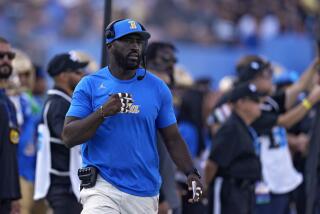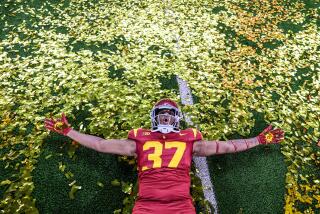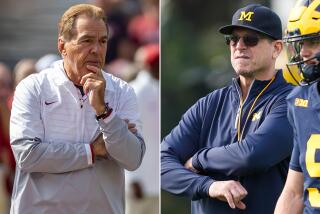Commentary : Let the Tubas Glare, Foes Beware
- Share via
The college football season began Thursday at 11:30 in the morning.
Forget the schedule. The schedule will feed you some malarkey about the season having begun on Aug. 29, at the Meadowlands in New Jersey, where Brigham Young and Boston College were supposed to bash heads in some Made-for-TV foolishness called The Kickoff Classic. The schedule will also insist a handful of contests were played last Saturday, including one as close as the Air Force Academy in Colorado Springs.
Nonsense.
The college football season doesn’t officially begin until the first bass drum of the first pep rally for the first big game thunders through the air, and until the first tuba keeps oom-pah-pah cadence in the September sun.
According to this truer (if less precise) calendar, the season started on Thursday. Providing the honors at a downtown Denver rally were the pep bands of Colorado State and Colorado, whose football teams will collide in Boulder Saturday.
I suppose it’s a bit simplistic, in this day and age, to associate college football with the sound of a bass drum and the glare of a tuba. There are urinalysis tests to conduct, and steroid epidemics to address, and hypocritical coaches to probe, and naughty boosters to ferret out of the glad-handing masses. College football is big business, and in a big business, the necessity of turning a bottom-line profit permeates each “Sis-Boom-Bah!”
But if we can’t pause for a moment to listen to the drums and watch the tubas, to savor the joy of being a peripheral part of the innocence that comes with college football, then what good are these games? What good are they if we can’t exult in a phenomenon called Saturday, when you know, as soon as you wake up, that the day holds something special near a football field, and that Sunday will never be the same?
Yes, I know, the pros play on Sunday, and I know that on any given sunny Sunday afternoon, Mile High Stadium is as panoramic a place as any in the National Football League. I know, too, that pro players are for the most part bigger, stronger and faster than their collegiate counterparts, that pro coaches are (theoretically) more single-purposed about winning, and, consequently, that the ultimate product is superior.
I know, I know.
But tell me this: Is better necessarily the same as more entertaining? Consider the case of Doug Flutie, who as a collegian enthralled the land and earned folk-hero status -- only to discover, once he got his feet loose in the USFL, what most everybody figured in the first place: At 5-foot-9 -- and we’re stretching it here -- he’s too short for the pro game.
Well, give me Doug Flutie and his last-second magic. Give me those card tricks in the Rose Bowl, and 10,000 pom-pons quaking in a student section, and cheerleaders who cry at the end of a losing game. You can kindly remove the Dallas Cowboy Whatevertheyares, and their cloned, go-go-booted compatriots, from every football field in existence, thank you.
Give me college fight songs, with their antiquated lyrics (have you ever heard anybody actually refer to a gonfalon?) and their unyielding but lovely optimism: Fight. Move. Drive. Remember thee. And cheer, always cheer; cheer to wake up the echoes calling her name.
That’s how people thought, and talked, as football evolved from its rugby roots and went to college. That’s how people talked before mandatory urinalysis tests and steroids.
“Come hear the band!” they implore at Stanford, where three years ago the band got so restless to hear its stirring march it goose-stepped its way onto the field during a last-second kick.
More to Read
Go beyond the scoreboard
Get the latest on L.A.'s teams in the daily Sports Report newsletter.
You may occasionally receive promotional content from the Los Angeles Times.






